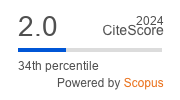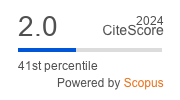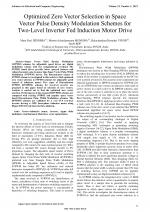| 1/2023 - 2 |
Optimized Zero Vector Selection in Space Vector Pulse Density Modulation Schemes for Two-Level Inverter Fed Induction Motor DriveJEESHMA, M. P. |
| Extra paper information in |
| Click to see author's profile in |
| Download PDF |
Author keywords
induction motor, inverter, sigma delta modulator, total harmonic distortion, vector quantization
References keywords
vector(17), space(15), electronics(15), modulation(12), power(11), scheme(8), multilevel(8), applications(8), motor(7), jacob(7)
Blue keywords are present in both the references section and the paper title.
About this article
Date of Publication: 2023-02-28
Volume 23, Issue 1, Year 2023, On page(s): 11 - 18
ISSN: 1582-7445, e-ISSN: 1844-7600
Digital Object Identifier: 10.4316/AECE.2023.01002
Web of Science Accession Number: 000937345700002
SCOPUS ID: 85150223686
Abstract
Space Vector Pulse Density Modulation (SVPDM) schemes for adjustable speed drives are digital modulation scheme with less computational overhead. The SVPDM based drives provide better spectral features and reduced acoustic noise in motor than Space Vector Pulse Width Modulation (SVPWM) drives. The discontinuous nature of SVPDM scheme is investigated in this article to find optimized zero vector selection in SVPDM schemes for adjustable speed control of induction motor. Five types of Discontinuous SVPDM (DSVPDM) schemes for two-level inverter are proposed in this paper based on selection of zero vectors. Analysis is carried out to find the optimized zero vector selection. Performances of the proposed DSVPDM schemes are compared with existing SVPDM and popular space vector based Discontinuous Pulse Width Modulation schemes. The DSVPDM schemes are validated for a 11.5 kVA two-level inverter driving a 3-HP three-phase induction motor using dSpace DS1104 real time interface platform. |
| References | | | Cited By |
Web of Science® Times Cited: 1 [View]
View record in Web of Science® [View]
View Related Records® [View]
Updated today
SCOPUS® Times Cited: 1
View record in SCOPUS® [Free preview]
View citations in SCOPUS® [Free preview]
[1] New space vector pulse code modulation scheme for multilevel inverters with reduced zero sequence voltage and reduced switching losses, Paul, Jeeshma Mary, Balachandran Remabai, Vinod, Jacob, Biji, Journal of Power Electronics, ISSN 1598-2092, Issue 6, Volume 25, 2025.
Digital Object Identifier: 10.1007/s43236-024-00944-9 [CrossRef]
Disclaimer: All information displayed above was retrieved by using remote connections to respective databases. For the best user experience, we update all data by using background processes, and use caches in order to reduce the load on the servers we retrieve the information from. As we have no control on the availability of the database servers and sometimes the Internet connectivity may be affected, we do not guarantee the information is correct or complete. For the most accurate data, please always consult the database sites directly. Some external links require authentication or an institutional subscription.
Web of Science® is a registered trademark of Clarivate Analytics, Scopus® is a registered trademark of Elsevier B.V., other product names, company names, brand names, trademarks and logos are the property of their respective owners.
Faculty of Electrical Engineering and Computer Science
Stefan cel Mare University of Suceava, Romania
All rights reserved: Advances in Electrical and Computer Engineering is a registered trademark of the Stefan cel Mare University of Suceava. No part of this publication may be reproduced, stored in a retrieval system, photocopied, recorded or archived, without the written permission from the Editor. When authors submit their papers for publication, they agree that the copyright for their article be transferred to the Faculty of Electrical Engineering and Computer Science, Stefan cel Mare University of Suceava, Romania, if and only if the articles are accepted for publication. The copyright covers the exclusive rights to reproduce and distribute the article, including reprints and translations.
Permission for other use: The copyright owner's consent does not extend to copying for general distribution, for promotion, for creating new works, or for resale. Specific written permission must be obtained from the Editor for such copying. Direct linking to files hosted on this website is strictly prohibited.
Disclaimer: Whilst every effort is made by the publishers and editorial board to see that no inaccurate or misleading data, opinions or statements appear in this journal, they wish to make it clear that all information and opinions formulated in the articles, as well as linguistic accuracy, are the sole responsibility of the author.



